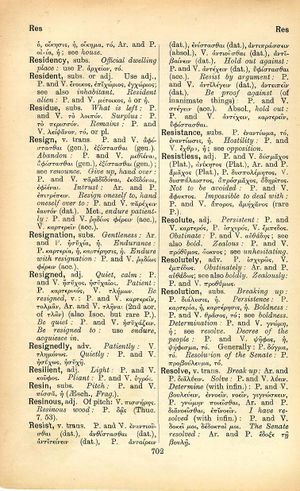resistless: Difference between revisions
From LSJ
Πενία δ' ἄτιμον καὶ τὸν εὐγενῆ ποιεῖ → Pauper inhonorus, genere sit clarus licet → Die Armut nimmt selbst dem, der edel ist, die Ehr'
(CSV4) |
m (Woodhouse1 replacement) |
||
| Line 1: | Line 1: | ||
{{Woodhouse1 | {{Woodhouse1 | ||
|Text=[[File:woodhouse_702.jpg|thumb|link={{filepath:woodhouse_702.jpg}}]] | |Text=[[File:woodhouse_702.jpg|thumb|link={{filepath:woodhouse_702.jpg}}]] | ||
P. and V. [[δύσμαχος]] ( | ===adjective=== | ||
[[prose|P.]] and [[verse|V.]] [[δύσμαχος]] ([[Plato]]), [[ἀνίκητος]] ([[Plato]]), [[Aristophanes|Ar.]] and [[prose|P.]] [[ἄμαχος]] ([[Plato]]), [[prose|P.]] [[δυσπολέμητος]], [[δυσπάλαιστος]], [[ἀπρόσμαχος]], [[ἀδηριτος]]. | |||
[[not to be avoided]]: [[prose|P.]] and [[verse|V.]] [[ἄφυκτος]]. | |||
[[impossible to deal with]]: [[prose|P.]] and [[verse|V.]] [[ἄπορος]], [[ἀμήχανος]] (rare [[prose|P.]]). | |||
}} | }} | ||
Revision as of 08:54, 20 May 2020
English > Greek (Woodhouse)
adjective
P. and V. δύσμαχος (Plato), ἀνίκητος (Plato), Ar. and P. ἄμαχος (Plato), P. δυσπολέμητος, δυσπάλαιστος, ἀπρόσμαχος, ἀδηριτος.
not to be avoided: P. and V. ἄφυκτος.
impossible to deal with: P. and V. ἄπορος, ἀμήχανος (rare P.).

